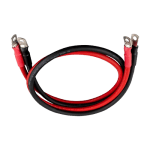
Solar PV Cables in Kenya – Types, Uses and Sizes
August 2, 20251. Tax Exemptions for Solar Equipment
Kenya offers several tax incentives to promote renewable energy adoption:
a) VAT Exemption
- Solar equipment (panels, inverters, batteries, charge controllers) is zero-rated for VAT under the Value Added Tax Act, 2013 (Schedule 1).
- Legislation Link: Value Added Tax Act, 2013 (See Part II, “Zero-Rated Supplies”).
- Rationale: To reduce upfront costs for solar adoption in households and businesses.
b) Import Duty Exemption
- Solar equipment (e.g., panels, batteries) imported into Kenya is exempt from import duty under the East African Community Customs Management Act (EAC CMA).
- Legislation Link: EAC CMA, 2004 (See Schedule 4, Part B – “Capital Goods”).
- Conditions: Proof that equipment is for renewable energy use.
c) Corporate Tax Incentives
- Companies investing in renewable energy projects (including solar) can claim investment deductions (50–100%) under the Income Tax Act.
- Legislation Link: Income Tax Act, Cap 470 (See Part III, Section 24 on Deductions).
2. Relevant Government Legislation
- Energy Act, 2019
- Promotes renewable energy and outlines incentives for solar adoption.
- Energy Act, 2019 (See Part VI on Renewable Energy).
- Kenya Renewable Energy Policy
- Framework for tax incentives and grid integration for solar.
- Ministry of Energy Policy Documents.
- Kenya Revenue Authority (KRA) Guidelines
- KRA clarifies tax exemptions for solar equipment.
- KRA Tax Exemptions Guide.
3. News Articles & Reports
- Business Daily Africa (2020)
- “Kenya waives VAT on solar equipment to boost green energy”
- Link.
- The Standard (2021)
- “Tax breaks for solar energy users to cut power costs”
- Link.
- Nation Africa (2022)
- “How solar tax exemptions are driving Kenya’s green energy shift”
- Link.
- Business Daily Africa – VAT Exemptions on Solar Energy
- Kenya Renewable Energy Policy – Ministry of Energy
- Kenya Bureau of Standards – Solar Equipment Regulations
4. Key Institutions for Compliance
- Energy and Petroleum Regulatory Authority (EPRA): Licenses and regulates solar installations.
- Kenya Power: Grid-tied solar connection guidelines.
5. Challenges & Considerations
- Documentation: Importers must provide proof of solar equipment use to qualify for duty exemptions.
- Counterfeit Products: Verify equipment standards with KEBS (Kenya Bureau of Standards).
- Updates: Tax policies may change; consult KRA or a tax advisor for the latest guidelines.
6. Challenges in Implementing Solar Tax Incentives
Despite these favorable policies, some challenges remain, including:
- Inconsistent application of VAT exemptions at customs.
- Lack of awareness among importers, businesses, and consumers about tax benefits.
- Delays in tax exemption approvals from the Kenya Revenue Authority (KRA).
To fully benefit from these incentives, solar power businesses and consumers must stay updated on tax laws and compliance requirements.
7. Import Duty Exemptions
To encourage the growth of the renewable energy sector, solar equipment is exempt from import duty under Kenya’s customs laws. This exemption covers:
- Solar panels (PV modules)
- Solar charge controllers
- Solar inverters
- Lithium and lead-acid solar batteries
- Solar water heaters
Import duty exemption reduces the cost of importing solar equipment, making it easier for businesses to distribute and install solar systems across the country.
Reference: East African Community Customs Management Act
8. Conclusion
Kenya’s taxation policies and exemptions on solar power equipment make solar energy more affordable for businesses and households. VAT and import duty exemptions, coupled with income tax incentives, encourage the adoption of solar solutions, supporting the country’s clean energy transition.
For the most accurate details, contact:
- KRA Taxpayer Service: kra.go.ke
- EPRA Renewable Energy Desk: renewableenergy@epra.go.ke.




